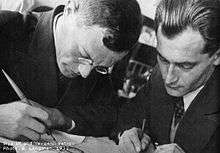Ilf and Petrov
Ilya Ilf (Ilya Arnoldovich Feinsilberg) (Russian: Илья Арнольдович Файнзильберг, 1897–1937) and Evgeny or Yevgeni Petrov (Yevgeniy Petrovich Kataev/Katayev or Russian: Евгений Петрович Катаев, 1902–1942) were two Soviet prose authors of the 1920s and 1930s. They did much of their writing together, and are almost always referred to as "Ilf and Petrov". They were natives of Odessa.

Publications
Ilf and Petrov gained a high profile for their two satirical novels: The Twelve Chairs (1928) and its sequel, The Little Golden Calf (1931). The two texts are connected by their main character, Ostap Bender, a con man in pursuit of elusive riches. Both books follow exploits of Bender and his associates looking for treasure amidst the contemporary Soviet reality. They were written and are set in the relatively liberal era in Soviet history, the New Economic Policy of the 1920s. The main characters generally avoid contact with the apparently lax law enforcement. Their position outside the organized, goal-driven, productive Soviet society is emphasized. It also gives the authors a convenient platform from which to look at this society and to make fun of its less attractive and less Socialist aspects. These are among the most widely read and quoted books in Russian culture. The Twelve Chairs was adapted for ca. twenty movies, in the USSR (by Leonid Gaidai and by Mark Zakharov), in the US (in particular by Mel Brooks), and in other countries.
From the late 1920s to 1937, the co-authors wrote several theatrical plays and screenplays, as well as many humorous short stories and satirical articles in the magazines: Chudak, 30 days, Krokodil, Ogoniok, the newspapers: Pravda, Literaturnaya Gazeta. In the first years of joint creativity Ilf and Petrov published their stories and satirical under parodic pseudonyms: Tolstoevsky (composed of the names of writers Tolstoy and Dostoevsky), Don Busilio (from Don Basilio, character in the opera The Barber of Seville, and the Russian verb busa – scandal, noise), Cold philosopher and others.[1]
The two writers also traveled across the Great Depression-era United States. Ilf took many pictures throughout the journey, and the authors produced a photo essay entitled "American Photographs", published in Ogoniok magazine.[2] Shortly after that they published the book Одноэтажная Америка (literally: "One-storied America"), translated as Little Golden America[3] (an allusion to The Little Golden Calf). The first edition of the book did not include Ilf's photographs. Both the photo essay and the book document their adventures with their characteristic humor and playfulness. Notably, Ilf and Petrov were not afraid to praise many aspects of the American lifestyle in these works. The title comes from the following description.
America is primarily a one-and two-storey country. The majority of the American population lives in small towns of three thousand, maybe five, nine, or fifteen thousand inhabitants.
Vladimir Nabokov considered them to be "wonderfully gifted writers".[4]
Script authors
- Woman-Sycophant – comic play (1930, «Подхалимка»)[5]
- House-Barracks – screenplay (1931, «Барак»)[6]
- Strong Feeling – vaudeville (1933 «Сильное чувство»)[7]
- Under the Circus Dome – comic play (1934, with Valentin Kataev, «Под куполом цирка»)[8]
In culture
The minor planet 3668 Ilfpetrov, discovered by Soviet astronomer Lyudmila Georgievna Karachkina in 1982, is named after them.[9]
Bibliography
- Двенадцать стульев [The Twelve Chairs] (in Russian), 1928
- The Twelve Chairs, Northwestern University Press, 1997, ISBN 0-8101-1484-4
- Золотой теленок [The Little Golden Calf], 1931
- Одноэтажная Америка [One-storied America]
- Little Golden America, 1974 [1937], ISBN 4871876748[3]
- Ilf and Petrov's American Road Trip. Princeton Architectural Press. 2006. ISBN 9781616892524. (a translation of "American Photographs" published in Ogonyok)
References
- List of works by Ilf and Petrov.
- Ogoniok magazine: 1936, # 11-17, 20-23 (11 photo essays: Ilf's photos, Ilf and Petrov's texts).
- Ilf, Ilya; Petrov, Eugene (1937). Little Golden America. New York: Farrar & Rinehart.
- Golla, Robert (2017). Conversations with Vladimir Nabokov. Univ. Press of Mississippi. p. 139. ISBN 9781496810984.
- The play is staged at the Moscow music hall in 1930.
- The comedy "Black Barrack" was released in 1933..
- The play is staged at the Moscow Satire Theatre in 1933.
- Grigori Aleksandrov used this play for the script of the film "Circus".
- Schmadel, Lutz D (2003). Dictionary of Minor Planet Names (5th ed.). New York: Springer Verlag. p. 308. ISBN 3-540-00238-3.
External links
- The Twelve Chairs (full text), RU: Lib.
- Ilf, I; Petrov, E (2004). "American Photographs: The Road". Cabinet (14). (first chapter of American Photographs)
- Ilf and Petrov, life, work and background (in English and Russian), NL.
- "Conversations at Tea" by Ilf and Petrov. Humorous story about generation gap between an Old Bolshevik and his young son, United States.
| Wikimedia Commons has media related to Ilf and Petrov. |